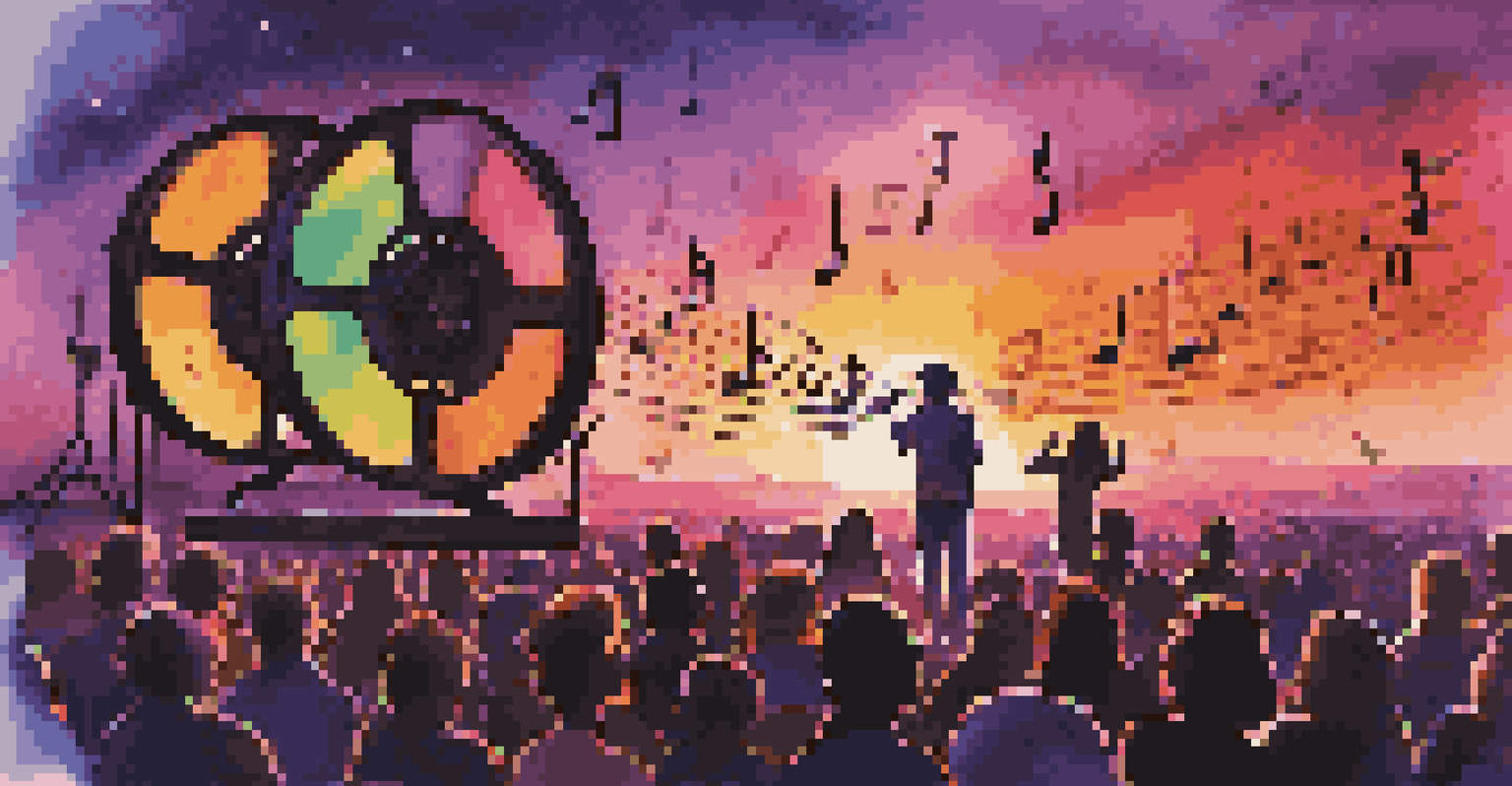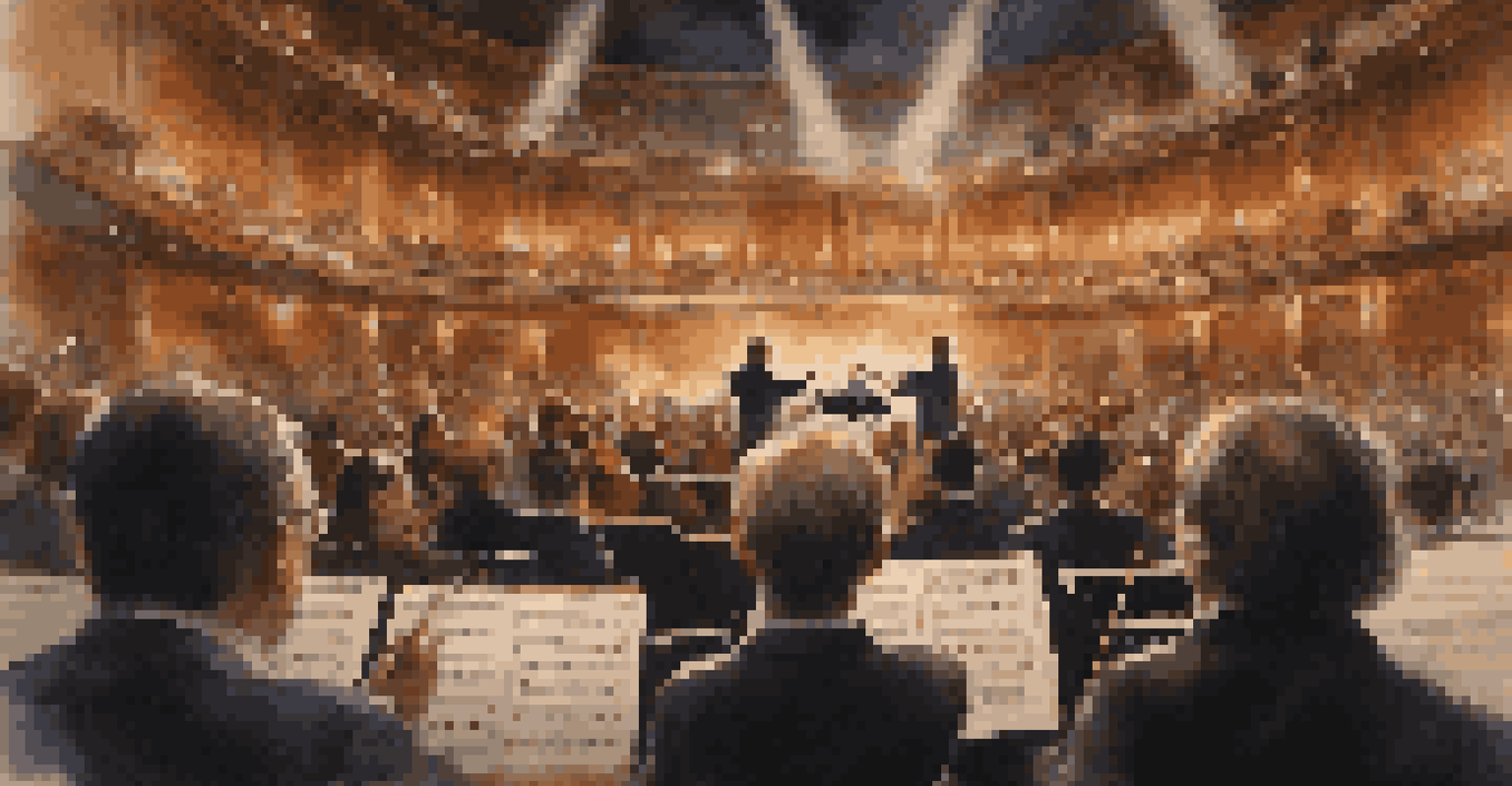The Connection Between Film Scoring and Psychological Effects

Understanding Film Scoring: An Overview
Film scoring is the art of composing music specifically for movies. It serves to enhance the narrative and emotional impact of a film. Think of it as the invisible thread that stitches together scenes and moments, guiding the audience's feelings and reactions.
Music is the shorthand of emotion.
A great film score amplifies the storytelling experience, often without viewers even realizing it. Just like a painter uses colors to evoke emotions, composers use melodies, harmonies, and rhythms to set the tone of a scene. This connection between music and emotion is what makes film scores so powerful.
From the suspenseful strings in a thriller to the sweeping orchestral themes in a romance, the right score can transform a scene entirely. It’s not just background noise; it’s a crucial component that shapes how we perceive characters and events on screen.
The Psychological Power of Music in Film
Music has a unique ability to trigger emotional responses, and this is profoundly evident in film. Research shows that certain musical cues can elicit feelings of joy, sadness, anxiety, or excitement. For instance, a fast-paced score can heighten tension during a chase scene, making our hearts race.

This psychological effect is not limited to just the visuals; it creates a multisensory experience. When we hear a familiar theme, it can evoke memories or feelings associated with previous viewings, creating a deeper emotional connection to the film. It's almost like our brains have a soundtrack for our memories.
Moreover, the use of silence or minimalistic scores can also serve a psychological purpose, creating a stark contrast that pulls us into the narrative. These techniques remind us that music isn’t merely an addition to film; it’s a fundamental part of how we emotionally engage with the story.
Cues and Signals: Music as Emotional Guidance
Film scores often use specific musical cues to signal shifts in emotion or plot. For example, a sudden change in music can alert us to a twist or reveal, guiding our emotional response. This technique helps viewers navigate complex narratives without getting lost.
The music can be a character in a film, just as much as the actors.
Think about iconic moments in film, like the haunting theme from 'Jaws.' The ominous music signals impending danger long before we see the shark, heightening our anticipation and fear. This shows how composers can manipulate our emotions through sound, even before visual elements come into play.
These musical signals work in tandem with the visuals, creating a seamless experience that resonates on a deeper level. By understanding these cues, audiences can appreciate the artistry behind film scoring and how it shapes our viewing experience.
Case Studies: Iconic Film Scores and Their Effects
Let’s look at a few iconic film scores to see their psychological impact. In 'Star Wars,' John Williams’ score evokes a sense of adventure and heroism, instantly transporting audiences to a galaxy far, far away. The powerful orchestration and memorable themes create a sense of nostalgia and excitement.
Conversely, consider the eerie score of 'Psycho' by Bernard Herrmann. The chilling strings during the shower scene have become synonymous with horror, effectively instilling fear and dread. This is a prime example of how music can define a genre and influence viewer perception.
These case studies demonstrate not just the talent of the composers, but also the profound connection between music and the emotions conveyed on screen. The right score can elevate a film from good to unforgettable, leaving a lasting impression on audiences.
The Role of Silence in Film Scoring
While music plays a significant role in film scoring, silence is equally powerful. Strategic use of silence can create tension, provoke thought, or allow audiences to process emotional moments. In many cases, it’s the absence of sound that speaks volumes.
For instance, in 'The Silence of the Lambs,' moments of silence create an unsettling atmosphere, enhancing the psychological intensity of the film. This contrast between music and silence is a tool that skilled composers utilize to manipulate audience emotions.
By understanding the role of silence, we can appreciate the complexity of film scoring. It’s a delicate balance between sound and quiet, both of which are essential in crafting a compelling narrative.
Audience Connection: How Scores Shape Viewer Experience
Film scores have a remarkable ability to foster a connection between the audience and the film. When music resonates with viewers, it enhances their emotional investment in the story. This connection can lead to a more memorable experience, making viewers feel as though they are part of the narrative.
For example, the score of 'Titanic' captures the essence of love and loss, pulling at our heartstrings long after the credits roll. By the end of the film, many viewers find themselves emotionally drained yet deeply moved, showcasing the power of music to evoke strong feelings.
This engagement goes beyond mere entertainment; it can also lead to discussions and reflections on the themes presented in the film. A well-composed score can prompt audiences to explore their own emotions and experiences, creating a lasting impact.
The Future of Film Scoring and Psychological Research
As technology advances, the field of film scoring is evolving, opening new avenues for emotional exploration. Composers are experimenting with sound design and electronic music to create immersive experiences that resonate with audiences on multiple levels. This evolution presents exciting opportunities to delve deeper into psychological effects.
Research continues to explore how different musical elements influence emotions and perceptions in film. As we learn more about the brain’s response to music, film scores may become even more tailored to elicit specific psychological reactions.

In this ever-changing landscape, the importance of film scoring remains constant. It is not just about creating a beautiful melody; it’s about enhancing storytelling and fostering emotional connections, ensuring that music remains a vital part of the cinema experience.